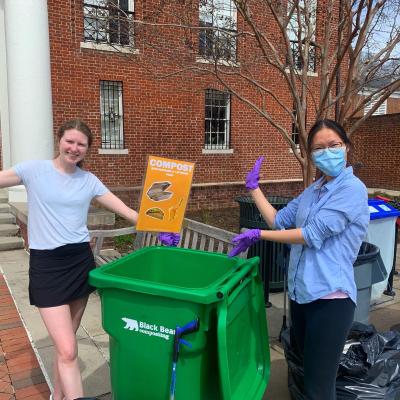Zero Waste Events
Waste minimization is a top priority for the University as we aim to reduce our waste footprint 70% by 2030, with a focus on reducing waste generated on Grounds and diverting waste from the landfill. As of 2021, we had reduced total waste to almost 39% of 2010 levels, more than half way to our goal.
UVA applies a multi-prong approach including reusing items, recycling, composting, reducing the amount of materials purchased and ensuring that materials we do purchase are environmentally sustainable. Since mid-2021, UVA prohibits the purchase and use of certain single-use plastics, such as bottled water, plates, cups, cutlery and bags.
Zero Waste Events
Students, staff and faculty host thousands of events every year, each one generating considerable waste from food and beverage service. UVA's Office for Sustainability and Recycling Department partner to provide resources, guidance, and support for setting up events to be "zero waste" -- including how to comply with UVA’s prohibition of certain single-use plastics, providing composting and recycling options for your guests, and general tips for hosting sustainable events.
To learn how to host a Zero Waste Event check out the video below. For questions, see the FAQs at the bottom of the page or email [email protected] for assistance.
Frequently Asked Questions
- What is a Zero Waste event?
-
At UVA, an event is considered zero waste if at least 90% of waste generated goes to a composting facility or a recycling facility.
- How do I purchase compostable products?
-
A large majority of your event's waste stream will need to be compostable. That means everything from plates to utensils to coffee cups. To procure compostable items you can:
- Head to UVA Marketplace or your preferred store to order items in bulk. Make sure the product description clearly states that the item is “compostable” and/or “BPI Certified.”
- Head to the paper products section of our local Kroger, which stocks compostable wares. Make sure the product description clearly states that the item is “compostable” and/or “BPI Certified.”
- CIOs or Student Groups can request free compostable wares from the Recycling Department for events up to 150 people. You can request specific products and amounts in the Zero Waste Events Request Form.
- How do I request compost, recycling or landfill bins?
-
Now that you have procured compostable wares, you need a place to put them at the end of your event! To collect event waste, use the ZWE form to request compost, recycling and landfill bins.
- How can I communicate about waste minimization at my event?
-
You have gone through the logistical efforts, let us make sure the attendees know what to do with their waste. Here are some good Zero Waste event communication tips:
- Make note in any promotional materials (social media, fyers, pre-event emails) that composting will be available at the event.
- Make an announcement at the beginning of the event when all attendees are together. You could say something like: “We are trying to minimize our waste at this event. Please make sure to put all your utensils, plates, cups and food waste in the yellow compost bins.”
- Place signs above each bin and tape the waste items onto the signs. This will give attendees a visual hint about where each item should go. The Office for Sustainability has signs that we would be happy to provide.
- How can I prevent contamination at my event?
-
Avoiding contamination is the most important step of hosting a Zero Waste event. It's crucial that we have no contamination (non-compostable items) in the compost bins since the material will be handled by people and used as organic compost on local farms. To avoid contamination:
- Have a designated Zero Waste volunteer to keep an eye on the compost bins throughout your event. Make sure they know which items are compostable and that they have proper gear (such as gloves or a trash grabber/picker) in case they will need to remove items from the bin. For larger events, we encourage groups to have multiple Zero Waste volunteers.
- Co-locate bins. You should have a recycling bin and landfill bin next to every compost bin. This ensures that any items that are not compostable end up in the right bin.
- Educate your attendees through announcements and signage. Make sure they know what items should be going into which bins.


